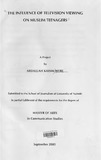| dc.contributor.author | Were, Abdalla K | |
| dc.date.accessioned | 2012-11-13T12:43:03Z | |
| dc.date.available | 2012-11-13T12:43:03Z | |
| dc.date.issued | 2005 | |
| dc.identifier.uri | http://erepository.uonbi.ac.ke:8080/handle/123456789/6396 | |
| dc.description | (data migrated from the old repository) | |
| dc.description.abstract | Television has become a household asset to many families in the world today with most homes having bought the set one or more for the family information and entertainment. The television viewing has been found to be influential in many ways both positive and negative depending on the usage of the facility. The objective of this study was to assess the influence of television viewing on the Muslim teenagers considering the fact that it was exposing them to taboo thoughts of sex and nudity, which Islamic culture does not allow to be exposed to teenagers in an earlier age as it is done in television programmes around the world. The study was to compare between those teenagers who view television with parents and those who did not view with parents, those whose parents control what they watch against those who did not offer any form of control, those who watched adult rated television movies against those who watched only children movies, and other programmes allowed for teenagers.
The researcher was then to assess and find out if there were any kinds of behaviour change in respect to different viewing pattern applied by teenagers in relation to the Islamic code of behaviour. A study was conducted in Nairobi in 2005 with two city estates (Nairobi South C and Eastleigh) becoming the main areas of the research survey. The survey was also conducted in two Muslim secondary schools in Nairobi (Kenya Muslim Academy-Huruma and Nairobi Muslim Academy-South C). The data was mainly collected using the research questionnaire that was distributed to the respondents in the main mosques within the estates after Friday and Isha prayers. However, the research data was not collected at the Nairobi Muslim Academy for a simple reason that the principal of the school refused the researcher to distribute the research questionnaire arguing that the questions were not ethically formulated. She demanded that the researcher rephrase the questions, a demand that was rejected by the researcher barring in mind that another similar school and various religious organizations had accepted the questionnaire format.
The two schools were to give a reflection on how teenagers perceive the television media and its programmes considering the fact that one school was from a relatively lower class residential area (Kenya Muslim Academy) and the other from an affluent area (Nairobi Muslim Academy). The researcher was able to compensate for the lose of the data that was to be collected from Nairobi Muslim Academy by conducting a similar interview with teenage student from the same school but who leave in the area. This was done via the assistance of their parents whom the questionnaire were given at the Mosque, which is adjacent to the school. | en_US |
| dc.language.iso | en | en_US |
| dc.publisher | University of Nairobi, Kikuyu Campus | en_US |
| dc.subject | Television and teenagers | en_US |
| dc.subject | Television broadcasting -- Influence | en_US |
| dc.subject | Kenya - Television broadcasting | en_US |
| dc.title | The influence of television viewing on muslim teenagers | en_US |
| dc.type | Thesis | en_US |

